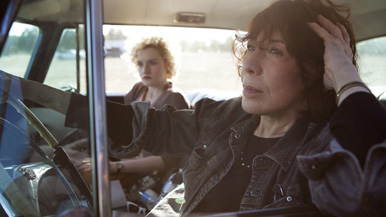|
|
Movie Review: GrandmaBy Ben GruchowOctober 1, 2015
Weitz does not stop there, and contained within Grandma’s startlingly brisk 78 minutes is a dense and truthful narrative about the complicated ways that people cling to the past, and what form that urge to hold on takes between members of the same family, and what that can do to and for us when it comes time to test those familial connections. Every major character in the film is related to Elle either by blood or by intimate relationship, past or current, and the character of the biggest import ends up being one who isn’t actually in the movie at all: it’s the specter of Elle’s recently deceased partner, Violet. Elle has a long way to go before she is healed from this, and Tomlin makes every line and action prickly and defensive. Every decision she’s asked to make burns away at a short fuse, informed by muted desperation, brought about by the fact that there’s another half to the decision that hasn’t yet been consulted and never will be. It’s remarkable how thoroughly Tomlin disappears into this person, and how she makes Elle an intimidating individual on the strength of movement, intonation, even a seeming loss of control. In some of the early scenes, the movie dangerously and daringly flirts with becoming unsympathetic; Elle’s outbursts and temper flares to those around her - ostensibly in the service of procuring the necessary funds for Sage’s procedure; Elle herself has only $43 in her account, and has chopped up her credit cards seemingly to make a statement nobody was asking for - are brittle and unstable things that seem to threaten a derailment of the movie’s tone.
|

|
|
|

|
Thursday, October 31, 2024
© 2024 Box Office Prophets, a division of One Of Us, Inc.


